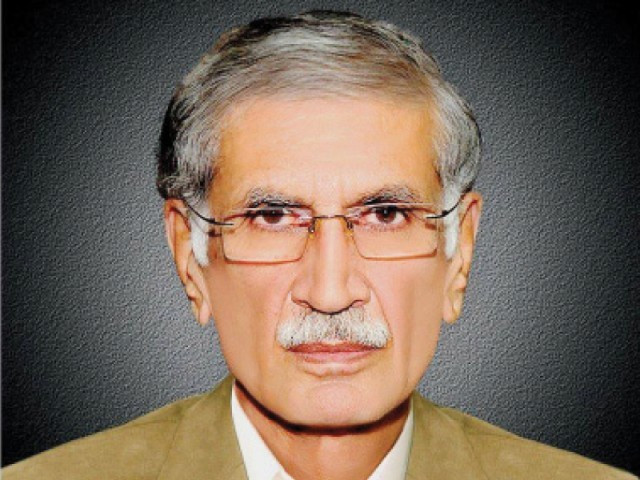The real test for Pervez Khattak
The LG setups are ideal indicators of good or bad governance

Pervez Khattak. PHOTO: FILE
Pakistan Tehreek-e-Insaf is well through two years in power. With a few noticeable hiccups along the way, the party has still managed to hold on to the steering wheel real tight. As it sails towards completing its first ever tenure in a government driving seat, some of the hardships and challenges have emerged out of the dark. While numerous problems exist within its own house, the situation has turned sticky with its allies too.
Gone are the days when the very eager Awami Jamhoori Ittehad Pakistan was reminding PTI of a possible merger on a daily basis. Schedules are announced, ceremonies are fixed yet the holy matrimony is put off for a later date. A PTI MPA said, “Yes party leaders are unhappy over AJIP’s reluctance. Despite making promises and taking hold of the health ministry, they are yet to make their mind. It is frustrating to see all that happen. If they don’t want to merge, they don’t deserve to have the ministry.”
AJIP chief and Minister for Health Shahram Khan Tarakai disagreed, “There is no issue with anything. It’s just that internal consultation is taking a while. A majority of our members are in favour of the merger.”
Then comes Jamaat-e-Islami whose sisterhood with PTI is known to all. With an existential crisis knocking on the door, Sirajul Haq’s party chose to break out of the formation in numerous districts thanks to the local government electioneering that rewrote history in more ways than one. According to a PTI leader, “Our relations with JI are smooth. Things might change when both parties cruise towards filling the vacuum created in Karachi because of Muttahida Qaumi Movement’s troubles.”
Meanwhile, voices within the corridors of power opposing Aftab Ahmed Khan Sherpao-led Qaumi Watan Party’s entry to the ‘party’ have not died down as yet. A well-placed PTI leader agrees with the notion.
“Although Pervez Khattak is firm on his decision of bringing QWP back, certain elements have voiced their concerns repeatedly.”
He said the opposition is strong from the party’s Punjab leadership. When contacted, QWP MPA Anisa Zeb Tahirkheli said, “Visibly there is no hurdle but keeping past experiences in mind, we are treading with care.” Tahirkheli told The Express Tribune negotiations are still under way.
There is little good news from inside the house as well. So far the membership of at least three of its MPAs is on hold; on charges of going against Imran Khan’s wishes. Two others who were sacked from cabinet portfolios are yet to regain the confidence of party leaders. What started off as a revolt in two districts has engulfed the party’s entire K-P hierarchy. The chief minister’s insistence on keeping things his way and some immature and unrealistic steps taken by the government have certainly given a new lease of life to opposition parties who have strengthened their ranks considerably. An acute shortage of competent government officials has added to his woes.
Several qualified officers have chosen to file for a transfer to other provinces recently.
With all these challenges remaining to be surmounted, the formation of LG setups across the province has simply opened a new battlefront. Despite doing considerably well in at least nine districts, PTI will not find breathing space easily in the remaining 15 districts where other parties have come out strongly. A time might come when the party will have to choose between deviating from Imran’s agenda and inching towards total isolation.
Lowest tier
The local government setup is an interesting case in point. After a six-year hiatus, these governments will resume function on Tuesday.
In fact, the real test of the PTI, particularly the chief minister, will start with installation of the elected local government office holders. PTI Chairman Imran Khan and Chief Minister Pervez Khattak have time and again made claims of giving maximum powers to local government institutions. However, the implementation of such promises has been particularly difficult since it came into power 27 months later. With an exception of a few chosen ones, PTI MPAs have repeatedly complained of nepotism in the distribution of funds and resources.
The LG setups are ideal indicators of good or bad governance. They not only consolidate political structures but are vital for formulating internal and external policies on the macro level. History teaches us that LGs have only been domesticated by military dictators who used them to extend their reign and gain widespread support. It is now Khattak’s turn to do what has not been done as yet. He must nurture the LG setup and seal the deal for PTI’s future.
Published in The Express Tribune, August 31st, 2015.













COMMENTS
Comments are moderated and generally will be posted if they are on-topic and not abusive.
For more information, please see our Comments FAQ